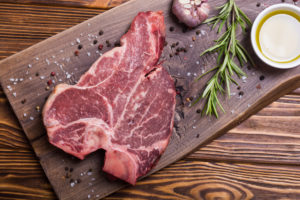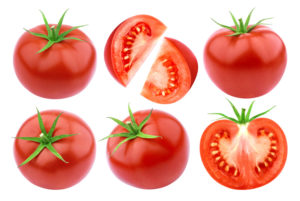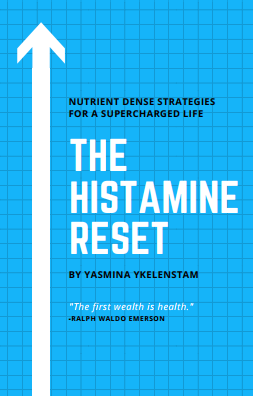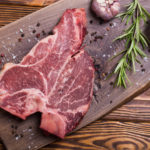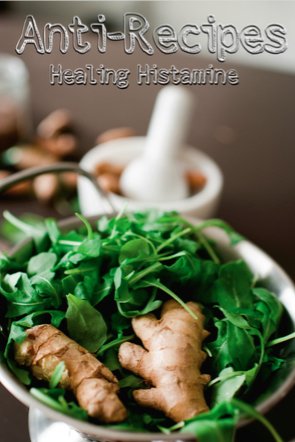
Most of us know that our gut plays an important role in our immune response. The levels of different species and strains of bacteria in the gut, and especially which bugs predominate, impacts our body’s responses to internal and external stressors and pathogens. As those of us with mast cell disorders and histamine intolerance know, keeping a balanced immune response is critical — and yet also challenging. So, how can we boost the good guys in our gut (especially when we’re avoiding a lot of bacteria)? There are ways… Read on.
EXERCISE
Did you know exercise can help balance your microbiome? Research in both animals and humans indicates it can. In the human study conducted at the University of Illinois at Urbana-Champaign, 32 previously sedentary men and women (18 lean, 14 obese) were given a 6-week exercise program followed by 6 weeks of no exercise. Samples were taken from their poo before the exercise program, immediately after the exercise program, and then again after the 6-week “washout period” of continued sedentary behavior. The samples were then evaluated to see how the gut bacteria changed from before exercise, after exercise, and after 6 weeks of returning to sedentary behavior.
While the changes in the gut bacteria over this time period were different for each individual, there were some patterns. The main point of interest is that the exercise increased the numbers of (beneficial) microbes that produce short-chain fatty acids (SCFA). This is a big deal because SCFAs have been found to lower inflammation in the gut AND in the rest of the body.
You’ve gotta stick with it, though. The beneficial changes in the gut microbiome reversed after the people returned to couch potato status. (Exercise is a mixed bag when it comes to histamine intolerance. See this post to learn how to make it work for you).
PREBIOTICS
Prebiotics are food ingredients that preferentially feed the beneficial bacteria in the gut, such as bifidobacteria and lactobacilli. There are a number of low- or antihistamine foods that are high in prebiotics such as inulin or Fructooligosaccharides (FOS) or Galactooligosaccharides (GOS). Some low histamine prebiotic foods include:
Artichokes (FOS)
Asparagus (FOS)
Cauliflower (GOS)
Chickpeas (GOS)
Jerusalem artichoke (FOS)
Jicama (FOS)
Lentils (GOS)
Red onion (FOS — also high in antihistamine quercetin and polyphenols)

You can also take prebiotic powders and add them to low histamine smoothies. Recommended ones include Bimuno GOS powder and partially hydrolyzed guar gum (technically a colonic food, rather than prebiotic). FOS/inulin is another option, but GOS is tolerated better in those with digestive issues.POLYPHENOLS
Polyphenols are colorful plant compounds that are known for their anti-inflammatory and antioxidant effects. Studies show they may also help protect the gut microbiome by inhibiting the growth of bad bugs and encouraging the growth of good bugs like firmicutes. Good sources of polyphenols include:
Almonds (high oxalate)
Black rice bran (histamine inhibitor)
Blueberries
Broccoli
Ginger (mast cell stabiliser)
Green tea (histamine inhibitor)
Pomegranate (mast cell stabiliser)
Red cabbage
Red onions (also high in antihistamine quercetin)
Sweet potatoes (high in histamine-lowering quercetin and rutin)
Turmeric
One interesting side note is that you might want to hang on to the husk when you peel your pomegranate. Pomegranate husk works as an antimicrobial against bad bugs, parasites, and candida while also promoting the growth of the beneficial species, bifidobacteria.
DON’T TAKE THESE
Avoid yogurt, kefir, kombucha, sauerkraut, kimchi, or other ferments recommended online or by misinformed practitioners. These ferments tend to be high in histamine and will just set off symptoms. However, there may be a way to do histamine safe ferments. Check out this post to find out. You may even want to look into rice-based kefir for low histamine, probiotic benefits. You can learn more about probiotic strains for histamine intolerance here.
I should add that probiotic supplements and fermented foods are literally just passing through. Unfortunately, you cannot recolonise the gut with probiotics if you have completely wiped out whole species with antibiotics. This is a popular misconception. The only way to recolonise annihilated gut bacteria is through a fecal transplant. Otherwise, if you have just reduced certain species to really low levels, you can bring them back to higher levels with the use of prebiotics. Prebiotics can be really powerful in bringing balance back to your gut microbiome.
You can learn which bugs you have left and which ones are high or low through a test like uBiome or Viome.
NEED SOME FUN IDEAS FOR FOOD + FITNESS?
Check out my complete histamine reset with recipes and lifestyle strategies to balance histamine levels and get your body on the path to healing: 28-Day Histamine Reset.
———REFERENCES———
Allen, J. M., Mailing, L. J., Niemiro, G. M., Moore, R., Cook, M. D., White, B. A., … Woods, J. A. (2018). Exercise Alters Gut Microbiota Composition and Function in Lean and Obese Humans. Medicine and Science in Sports and Exercise,
50(4), 747-757. doi: 10.1249/MSS.0000000000001495.
Bialonska D, Ramnani P, Kasimsetty SG, Muntha KR, Gibson GR, Ferreira D. (2010). The influence of pomegranate by-product and punicalagins on selected groups of human intestinal microbiota. International Journal of Food Microbiology. 2010;140(2-3):175–182.
Duda-Chodak, A., Tarko, T., Satora, P., & Sroka, P. (2015). Interaction of dietary compounds, especially polyphenols, with the intestinal microbiota: a review. European Journal of Nutrition, 54(3), 325–341. http://doi.org/10.1007/s00394-015-0852-y
Kristensen, N. B., Bryrup, T., Allin, K. H., Nielsen, T., Hansen, T. H., & Pedersen, O. (2016). Alterations in fecal microbiota composition by probiotic supplementation in healthy adults: a systematic review of randomized controlled trials. Genome Medicine, 8:52, https://doi.org/10.1186/s13073-016-0300-5
Neyrinck A.M., Van Hée V.F., Bindels L.B., De Backer F., Cani P.D., Delzenne N.M. Polyphenol-rich extract of pomegranate peel alleviates tissue inflammation and hypercholesterolaemia in high-fat diet-induced obese mice: Potential implication of the gut microbiota. Br. J. Nutr. 2013;109:802–809. doi: 10.1017/S0007114512002206.
Pandey, K. B., & Rizvi, S. I. (2009). Plant polyphenols as dietary antioxidants in human health and disease. Oxidative Medicine and Cellular Longevity, 2(5), 270–278.


